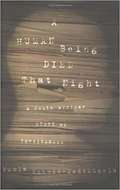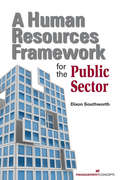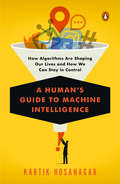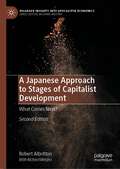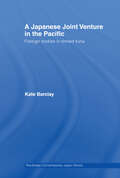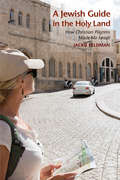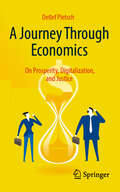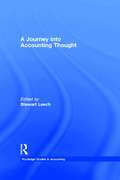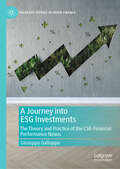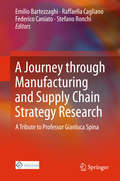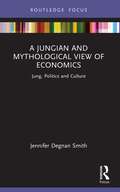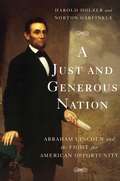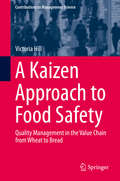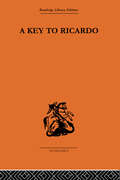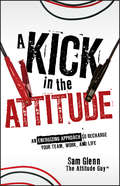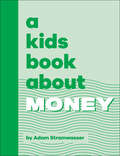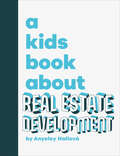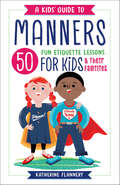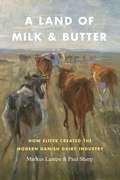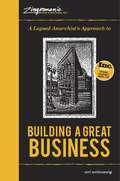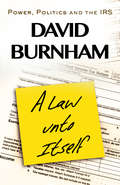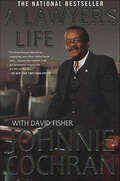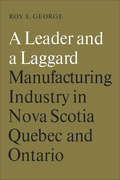- Table View
- List View
A Human Being Died That Night: A South African Story of Forgiveness
by Pumla Gobodo-MadikizelaA Human Being Died That Night recounts an extraordinary dialogue. Pumla Gobodo-Madikizela, a psychologist who grew up in a black South African township, reflects on her interviews with Eugene de Kock, the commanding officer of state-sanctioned death squads under apartheid. Gobodo-Madikizela met with de Kock in Pretoria's maximum-security prison, where he is serving a 212-year sentence for crimes against humanity. In profoundly arresting scenes, Gobodo-Madikizela conveys her struggle with contradictory internal impulses to hold him accountable and to forgive. Ultimately, as she allows us to witness de Kock's extraordinary awakening of conscience, she illuminates the ways in which the encounter compelled her to redefine the value of remorse and the limits of forgiveness.
A Human Resources Framework for the Public Sector
by Dixon Southworth MPAAn Entirely New Way to Look at Human Resources in the Public SectorWhat makes a good worker? Why do some people naturally do well at their jobs while others struggle? These questions are at the heart of the human resource (HR) profession. And while there is no shortage of theories about how people achieve success, no one has explained the entire body of HR theories. Until now.In A Human Resources Framework for the Public Sector, Dixon Southworth offers a fresh, new perspective on HR management with the first comprehensive theoretical framework for work performance, tying human resource theories, concepts, and concerns to public administration. With the introduction of the Work Performance Framework (WPF), Southworth offers a roadmap for work performance in the nonprofit and public sectors that focuses on three fundamental objectives of HR programs and services: build human resource capacity, build performance, and build community.
A Human's Guide to Machine Intelligence: How Algorithms Are Shaping Our Lives and How We Can Stay in Control
by Kartik HosanagarA Wharton professor and tech entrepreneur examines how algorithms and artificial intelligence are starting to run every aspect of our lives, and how we can shape the way they impact usThrough the technology embedded in almost every major tech platform and every web-enabled device, algorithms and the artificial intelligence that underlies them make a staggering number of everyday decisions for us, from what products we buy, to where we decide to eat, to how we consume our news, to whom we date, and how we find a job. We've even delegated life-and-death decisions to algorithms--decisions once made by doctors, pilots, and judges. In his new book, Kartik Hosanagar surveys the brave new world of algorithmic decision-making and reveals the potentially dangerous biases they can give rise to as they increasingly run our lives. He makes the compelling case that we need to arm ourselves with a better, deeper, more nuanced understanding of the phenomenon of algorithmic thinking. And he gives us a route in, pointing out that algorithms often think a lot like their creators--that is, like you and me.Hosanagar draws on his experiences designing algorithms professionally--as well as on history, computer science, and psychology--to explore how algorithms work and why they occasionally go rogue, what drives our trust in them, and the many ramifications of algorithmic decision-making. He examines episodes like Microsoft's chatbot Tay, which was designed to converse on social media like a teenage girl, but instead turned sexist and racist; the fatal accidents of self-driving cars; and even our own common, and often frustrating, experiences on services like Netflix and Amazon. A Human's Guide to Machine Intelligence is an entertaining and provocative look at one of the most important developments of our time and a practical user's guide to this first wave of practical artificial intelligence.
A Japanese Approach to Stages of Capitalist Development: What Comes Next? (Palgrave Insights into Apocalypse Economics)
by Robert AlbrittonThis book offers a novel treatment of one of the most important and long-standing research agendas in critical political economy: the theorizing of stages of capitalist development. Albritton advances the work of Japanese economist, Kozo Uno, to explore capital accumulation and its ideological, legal and political supports, not only in the stages of mercantilism, liberalism and imperialism, but also in the post-World War II capitalist stage of consumerism. The power of Albritton’s adoption of this Japanese approach resides in the crisp clarity it achieves over the way stage theorizing of capitalism draws on both economic theory and historical analysis.In the new, fully revised edition, written with Richard Westra, two new chapters are added. One meticulously examines the tendencies of capitalism euphemized as globalization and financialization which followed the crisis of the stage of consumerism. The other deals with current threats to civilization posed by burgeoning militarism, environmental destruction and climate apocalypse. The concluding chapter argues for the necessity of major social change to ensure a liveable future for humanity. The book will be of interest to researchers and students of political economy and the history of economic thought, as well as a wider audience interested in the transformation and crises of capitalism.
A Japanese Joint Venture in the Pacific: Foreign bodies in tinned tuna (Routledge Contemporary Japan Ser.)
by Kate BarclayThe Japanese, and other Asians, are increasingly taking over some of the roles previously played by Europeans in the Pacific islands, which is giving rise to interesting new economic relationships, and interesting new interactions between nationalities. This book considers the role of the Japanese in the Solomon Islands, focusing in particular on a
A Jewish Guide in the Holy Land
by Jackie FeldmanFor many Evangelical Christians, a trip to the Holy Land is an integral part of practicing their faith. Arriving in groups, most of these pilgrims are guided by Jewish Israeli tour guides. For more than three decades, Jackie Feldman--born into an Orthodox Jewish family in New York, now an Israeli citizen, scholar, and licensed guide--has been leading tours, interpreting Biblical landscapes, and fielding questions about religion and current politics. In this book, he draws on pilgrimage and tourism studies, his own experiences, and interviews with other guides, Palestinian drivers and travel agents, and Christian pastors to examine the complex interactions through which guides and tourists "co-produce" the Bible Land. He uncovers the implicit politics of travel brochures and religious souvenirs. Feldman asks what it means when Jewish-Israeli guides get caught up in their own performances or participate in Christian rituals, and reflects on how his interactions with Christian tourists have changed his understanding of himself and his views of religion.
A Journey Through Economic Time: A Firsthand View
by John Kenneth GalbraithA renowned economist presents an accessible, far-reaching history of the century's economics from World War I and the Russian Revolution, through the Depression and Keynesian theory, to colonialism's collapse and the rise of the Third World.
A Journey Through Economics: On Prosperity, Digitalization, and Justice
by Detlef PietschAnyone who does not know the history of economics cannot think competently about the future of economics. This book offers an introduction to economic history for those looking for more than just dry theory. The author takes you on a journey through the economy, from its beginnings in the Stone Age to the digitalization of modern times. In addition to the nature and fundamental principles of economics, the book also introduces great thinkers such as Aquinas, Keynes, and Erhard. While ancient philosophers like Plato and Aristotle focused mainly on the ethical dimension of economics, the first modern economist and moral philosopher, Adam Smith, for example, pondered how nations could achieve prosperity. Today, however—in an era where capitalism is increasingly under scrutiny—the question is how prosperity can reach everyone, especially in times of digitalization. Therefore, the book not only addresses economic concepts of the past and present but also offers an intriguing look into the future. Issues of social justice are discussed alongside topics such as digitalization, globalization, and ecology. The second edition has been updated to include a chapter on "Economics in Uncertain Times," which deals, among other things, with the economic consequences of the COVID-19 pandemic and the war in Ukraine.
A Journey into Accounting Thought
by Louis GoldbergThis book explores the role of accountants in business and society. The final work of Louis Goldberg, Professor Emeritus at the University of Melbourne, it aims to raise awareness of the existence and importance of fundamental issues that are often ignored or by-passed in contemporary discussion of accounting. The sixteen chapters assess exactly wh
A Journey into ESG Investments: The Theory and Practice of the CSR-Financial Performance Nexus (Palgrave Studies in Impact Finance)
by Giuseppe GalloppoThis book deals with climate finance and presents a balance between the theoretical framework—as drawn by the most widely cited practitioner-oriented and academic journals in environmental management—and experimental finance. Does sustainability work eventually? This book explores the data from empirical analysis to address this question. The book investigates the effectiveness of Corporate Social Responsibility and its empirical verification by analyzing the correlation between firm-specific ESG characteristics and financial performance, and will be of interest to academics, researchers, and practitioners of sustainable finance and climate finance.
A Journey through Manufacturing and Supply Chain Strategy Research: A Tribute to Professor Gianluca Spina
by Emilio Bartezzaghi Raffaella Cagliano Federico Caniato Stefano RonchiThis book is intended as atribute to Gianluca Spina, the influential and inspiring Professorof Business Management & Organization and Supply Chain Management at theSchool of Management of Politecnico di Milano, who very sadly passed away earlyin 2015. It brings together seven of his most important papers, published inrenowned international journals, and supplements these papers with insightfulcommentaries from friends and colleagues who highlight key messages and valuesof enduring validity. The selected papers offer a clear sense of Spina'sresearch journey over the years and cover the main research streams thatdistinguished his work. They have also been chosen on account of their highimpact, as reflected by the number of citations received, and to represent the mostimportant research collaborations that Spina had established within Italyand abroad. An introductory chapter relates his research to major developmentsin the field of Manufacturing and Supply Chain Strategy and also outlines thevery important contribution that Gianluca Spina made to Management Education.
A Jungian and Mythological View of Economics: Jung, Politics and Culture (Focus on Jung, Politics and Culture)
by Jennifer Degnan SmithThis book aims to re-vision economics by taking a Jungian view of the recent global economic crisis of the 2010s, focusing on Greece’s challenging experience in particular.Recognizing the genius loci of Greece by taking a terrapsychological approach allows Greece to be an active participant in the discussions rather than purely an object to be studied. Observing the crisis through the lenses of mythology, cultural complexes, and the God-image deepens the understanding of modern-day economics. These viewpoints reveal the unconscious and archetypal elements at play in the dysfunctions. Exposing the foundational issues is critical to redeeming economics and confirms the value in seeing socioeconomic issues from a Jungian perspective. The issues revealed through the exploration are not unique to Greece, but rather reflect many of the fundamental problems of the current global economic system. Thus, like its ancient myths, Greece’s modern-day story of suffering has insights for today’s world.The audience for this book includes and extends beyond Jungian psychology, and will also appeal to some in the field of economics and those interested in the application of Jungian ideas to sociocultural issues.
A Just Transition to Decarbonisation: Themes of Loss and Damage, Transport, Nature and Youth (Just Transitions)
by Gerry Nagtzaam Jadranka Petrovic Diane Kraal Katie O’Bryan Susie Siew HoThis book provides researchers and policy-makers with legal avenues to enable a just transition to decarbonisation. The focus is on the United Nations themes of loss and damage, transport, nature and youth - across Australia and other economies - to significantly reduce CO2 emissions by 2030 and beyond. The four themes scaffold discussions about a just transition beyond the UN Climate Change Conference COP28 in Dubai with the specific issues addressed in this book serving as a starting point for future discussions.
A Just and Generous Nation: Abraham Lincoln and the Fight for American Opportunity
by Harold Holzer Norton GarfinkleIn A Just and Generous Nation, the eminent historian Harold Holzer and the noted economist Norton Garfinkle present a groundbreaking new account of the beliefs that inspired our sixteenth president to go to war when the Southern states seceded from the Union. Rather than a commitment to eradicating slavery or a defense of the Union, they argue, Lincoln’s guiding principle was the defense of equal economic opportunity. Lincoln firmly believed that the government’s primary role was to ensure that all Americans had the opportunity to better their station in life. As president, he worked tirelessly to enshrine this ideal within the federal government. He funded railroads and canals, supported education, and, most importantly, issued the Emancipation Proclamation, which opened the door for former slaves to join white Americans in striving for self-improvement. In our own age of unprecedented inequality, A Just and Generous Nation reestablishes Lincoln’s legacy as the protector not just of personal freedom but of the American dream itself.
A Kaizen Approach to Food Safety: Quality Management in the Value Chain from Wheat to Bread (Contributions to Management Science)
by Victoria HillThis book provides a Management Science approach to quality management in food production. Aspects of food quality, product conformance and reliability/food safety are examined, starting with wheat and ending with its value chain transformation into bread. Protein qualities that influence glycemic index levels in bread are used to compare the value chains of France and the US. With Kaizen models the book shows how changes in these characteristics are the result of management decisions made by the wheat growers in response to government policy and industry strategy. Lately, it provides step-by-step instructions on how to apply kaizen methodology and Deming's work on quality improvement to make the HACCPs (Hazard Analysis and Critical Control Points) in food safety systems more robust.
A Key to Ricardo (Reprints Of Economic Classics Ser.)
by Oswald St. ClaireRicardo is one of the most imposing figures in the history of economic thought, yet at times his writings are among the most obscure. A Key to Ricardo traces, simplifies and clarifies Ricardo's ideas on the principal topics on which he wrote. The book provides a careful analysis of Ricardo's most cryptic passages and also explores areas where Ricardo appears to be mistaken. Setting Ricardo's writings against the context of his contemporaries, the relevance of the Ricardian contribution to subsequent economic thinking is nonetheless made very clear.
A Kick in the Attitude
by Sam GlennWhat Jumper Cables are to A Car Battery this Book is to YOUR Attitude "Good old fashioned advice on how to have a great attitude, delivered in a pithy andinteresting way. " -Karen Leland, bestselling author of Watercooler Wisdom: How Smart People Prosper in the Face of Conflict, Pressure and Change "Sam Glenn is known for his funny and motivational presentations and for his ability to give people a kick in the attitude. Now he has done it in print. " -Stewart Clifford, Enterprise Media "Sam Glenn energizes our worldwide audience with his profound sense of humor andgentle wisdom, making this giant in the motivation industry powerful and approachable. Experience his energy firsthand and feel it wake you up to the life you've always dreamed of. " -Markandeya, Life Without Limitation, EnergyTalkRadio. com "If there were an Attitude Hall of Fame, Sam Glenn and this book would be inducted into it! A Kick in the Attitude is the best book I've ever read on how to take an enthusiasticattitude and crank up your life to a higher, more powerful and successful level!" -Anne Bruce, professional speaker and author of Discover True North and How to Motivate Every Employee "Sam gets it when it comes to attitude. Read A Kick in the Attitude to jumpstart whateverybody needs for success-a great attitude. " -Dr. Charles Stone, pastor and author "No matter what your current 'drama,' the principles in A Kick in the Attitude will give you the motivation to turn any situation around. " -Marlene Chism, author of Success is a Given "Has the economy of 2009 got you down? Is life throwing lemons at you the size of cannon balls? Then stop and read this book. Sam Glenn is 'The Attitude Guy'! He will get you thinking about you and your attitude, then guide you to the understanding that you, and only you, control your attitude. " -Bob Hamm, Senior Account Manager, Omnipress
A Kids Book About Money: Kids Are Ready (A Kids Book)
by Adam StramwasserA simple framework for what money is and how to use it wisely.This is a kids book about money. Money is one of those things EVERYONE has to deal with in their life, but few of us have learned much about it. There may not be a more important topic for grownups to teach kids about than money. This book is a suitable way to introduce the topic to kids aged 5-9. It covers what money is, how to earn it, and how to use it wisely. Develop your child's financial skills in managing money including saving, budgeting and spending.A Kids Book About Money features: - A large and bold, yet minimalist font design that allows kids freedom to imagine themselves in the words on the pages.- A friendly, approachable, yet empowering, kid-appropriate tone throughout.- An incredible and diverse group of authors in the series who are experts or have first-hand experience of the topic.Tackling important discourse together! The A Kids Book About series are best used when read together. Helping to kickstart challenging, empowering, and important conversations for kids and their grownups through beautiful and thought-provoking pages. The series supports an incredible and diverse group of authors, who are either experts in their field, or have first-hand experience on the topic. A Kids Co. is a new kind of media company enabling kids to explore big topics in a new and engaging way. With a growing series of books, podcasts and blogs, made to empower. Learn more about us online by searching for A Kids Co.
A Kids Book About Real Estate Development (A Kids Book)
by Anyeley HallovaWhat do you know about real estate development? If your answer is “not a lot", you’re in the right place! Learn about this powerful industry, how it started, and how it can evolve in the future. Anyone can become a real estate developer, and everyone can be involved in how building projects impact their community.
A Kids' Guide to Manners: 50 Fun Etiquette Lessons for Kids & Their Families
by Katherine FlanneryMinding your manners is a blast with these etiquette lessons for kids ages 7 to 12 Today's kids need a fresh approach to manners that resonates with them. A Kids' Guide to Manners goes beyond saying "please" and "thank you" with fun, practical lessons that bring manners into the modern world.From meeting new people to being a courteous guest to texting a group of friends, kids will have fun as they learn to use manners in a way that will make their lives easier and more enjoyable. With 50 essential manners, plus interactive quizzes, entertaining examples, and at-home practice exercises, A Kids' Guide to Manners teaches kids where, when, and how to use manners as they relate to everyday life.With this true manners how-to guide kids will:Build good communication skills that will make it easy to get along with others, such as constructive ways to express emotions to the power of writing a thank you note.Feel confident in new situations by knowing what to do and say when meeting new people, dining in a more formal environment, or dealing with conflict and gossip.Learn proper tech etiquette that represents their best self over text, email, social media, as well as tips for knowing when it is or isn't appropriate to be using technology.With A Kids' Guide to Manners, both boys and girls will understand why manners matter and feel better than ever showing off their new social skills to everyone they know!
A Land of Milk and Butter: How Elites Created the Modern Danish Dairy Industry (Markets and Governments in Economic History)
by Paul Sharp Markus LampeHow and why does Denmark have one of the richest, most equal, and happiest societies in the world today? Historians have often pointed to developments from the late nineteenth century, when small peasant farmers worked together through agricultural cooperatives, whose exports of butter and bacon rapidly gained a strong foothold on the British market. This book presents a radical retelling of this story, placing (largely German-speaking) landed elites—rather than the Danish peasantry—at center stage. After acquiring estates in Denmark, these elites imported and adapted new practices from outside the kingdom, thus embarking on an ambitious program of agricultural reform and sparking a chain of events that eventually led to the emergence of Denmark’s famous peasant cooperatives in 1882. A Land of Milk and Butter presents a new interpretation of the origin of these cooperatives with striking implications for developing countries today.
A Lapsed Anarchist's Approach to Building a Great Business (Zingerman's Guide to Good Leading #1)
by Bo Burlingham Ari WeinzweigThe first in a series of books by Zingerman's co-founding partner Ari Weinzweig examines the basic building blocks of the culture and structure we know now as Zingerman's. These approaches are applicable whether you're running a law office, a library, a restaurant, a record label, a software firm, or an organic farm. They are the behind-the-scenes "secret" stuff that goes into making a very special, sustainable business of any kind. Inc. Magazine calls it one of the Best Books for Business Owners.
A Law Unto Itself
by David BurnhamThis is a fully documented inside examination of the Internal Revenue Service, in many ways the largest and most powerful of all federal agencies, and also the agency whose competent function is most essential to our democracy. The book's appearance in 1989 sparked a public furor and major legislation attempting to redress the IRS' many abuses of power, both political and bureaucratic. The book will be a relevant handbook as long as the agency remains a towering presence in American life.
A Lawyer's Life
by Johnnie Cochran David FisherThe most famous lawyer in America talks about the law, his life, and how he has won.Johnnie Cochran has been a lawyer for almost forty years. In that time, he has taken on dozens of groundbreaking cases and emerged as a pivotal figure in race relations in America. Cochran gained international recognition as one of America's best - and most controversial lawyers - for leading 'the Dream Team' defense of accused killer O.J. Simpson in the Trial of the Century. Many people formed their perception of Cochran based on his work in that trial. But long before the Simpson trial and since then Johnnie Cochran has been a leader in the fight for justice for all Americans. This is his story.Cochran emerged from the trial as one of the nation's leading African-American spokespersons - and he has done most of his talking through the courtroom. Abner Louima. Amadou Diallo. The racially-profiled New Jersey Turnpike Four. Sean "P. Diddy" Combs. Patrick Dorismond. Cynthia Wiggins. These are the names that have dominated legal headlines - and Cochran was involved with each of them. No one who first encountered him during the Simpson trial can appreciate his impact on our world until they've read his whole story.Drawing on Cochran's most intriguing and difficult cases, A Lawyer's Life shows how he's fought his critics, won for his clients, and affected real change within the system. This is an intimate and compelling memoir of one lawyer's attempt to make us all truly equal in the eyes of the law.
A Leader and a Laggard: Manufacturing Industry in Nova Scotia, Quebec and Ontario
by Roy GeorgeAdvanced countries in all parts of the world are concerned with the geographical unevenness of their development. Canada's preoccupation is with the Atlantic provinces, and for years government departments and agencies have tried to improve the region's economy. However, the evidence suggests that the economic gap between the Atlantic provinces and the rest of Canada has remained remarkably constant. This persistent gap has no shortage of explanations: lack of resources, the cost of transportation, insufficient markets, and a poor supply of skilled labour are problems often mentioned. This study investigates how far these and other factors account for slow industrial development. The author compares two regions of Canada: Quebec and Ontario, which together are considered the industrial leader; and Nova Scotia, the industrial laggard. He compares the costs of inputs for an average manufacturing firm in Nova Scotia from 1946 to 1962 with what those costs would have been had the firm been located in the Quebec-Ontario region. The analysis includes relative wage rates, labour productivity, the costs of materials, energy, and fuel, rates of interest and investment, transportation charges, levels of local taxation, and the supply of business enterprise. Canadian official statistics form the main basis of the comparisons, but where these are inadequate, information derived from three special studies carried out by the author is used. Dr George then explores the implications of the study's findings for public policy. He examines the relative cost and effectiveness of tax concessions, capital grants, industrial estates, transportation subsidies, and other remedial measures often advocated. Although the book uses a case study approach involving just two regions, it is relevant to the general theory of the location of industry, to regional economic policies, and to industrial development. It is essential reading for politicians and public servants who shape regional policies; for industrial promotion managers of municipalities; for businessmen choosing sites of new enterprises, and the consultants who advise them; for academics concerned with the theoretical aspects of the location of industry; and for anyone interested in industrial development.
